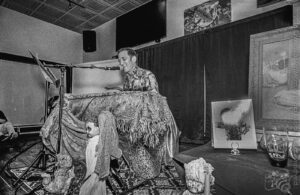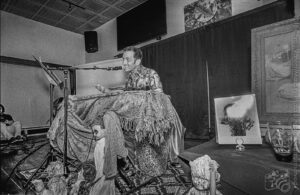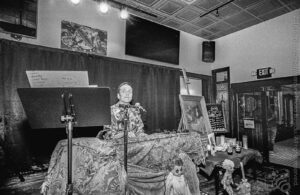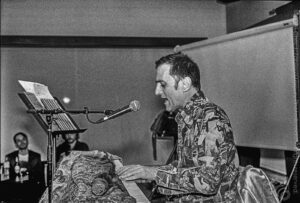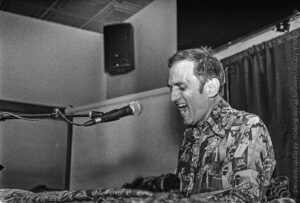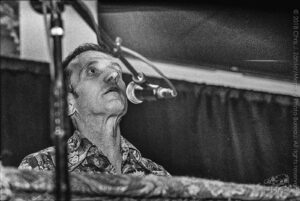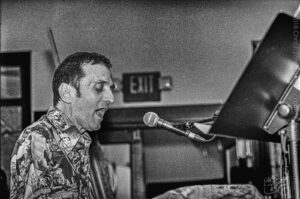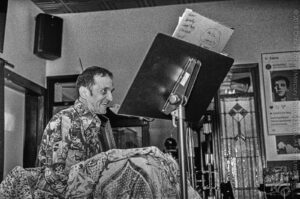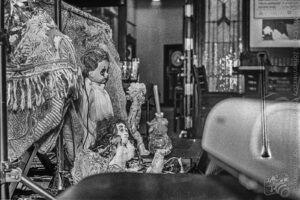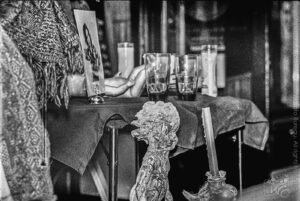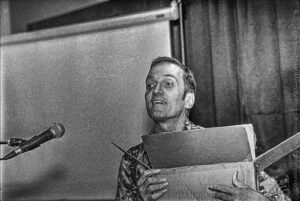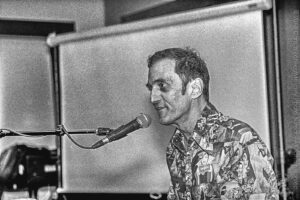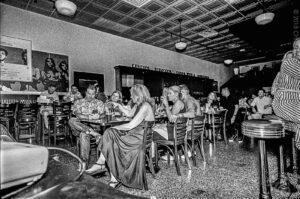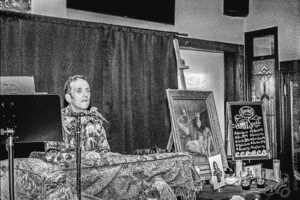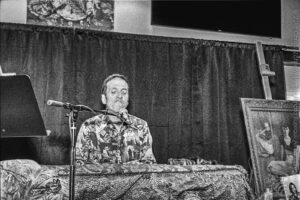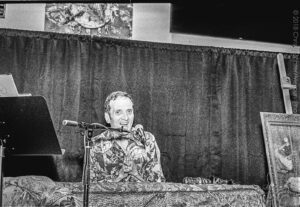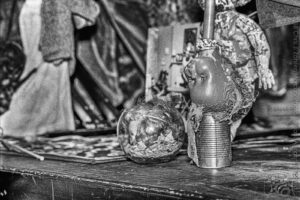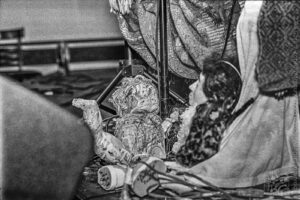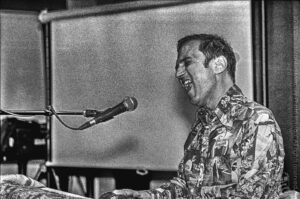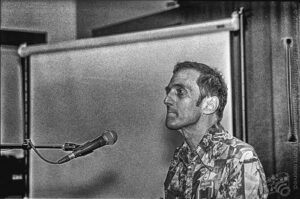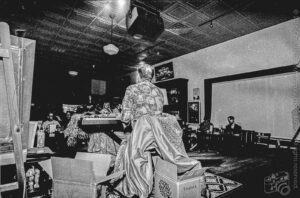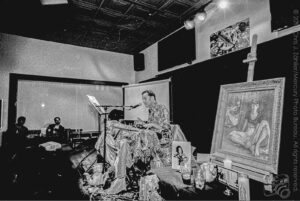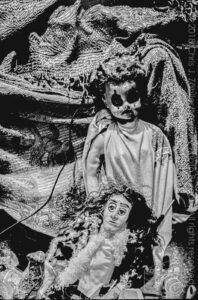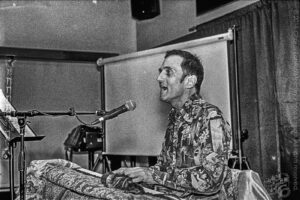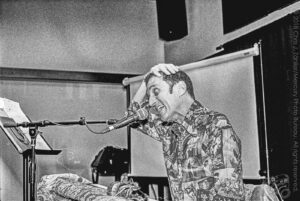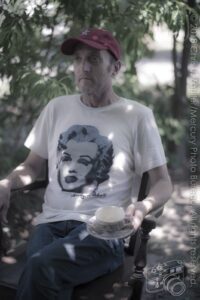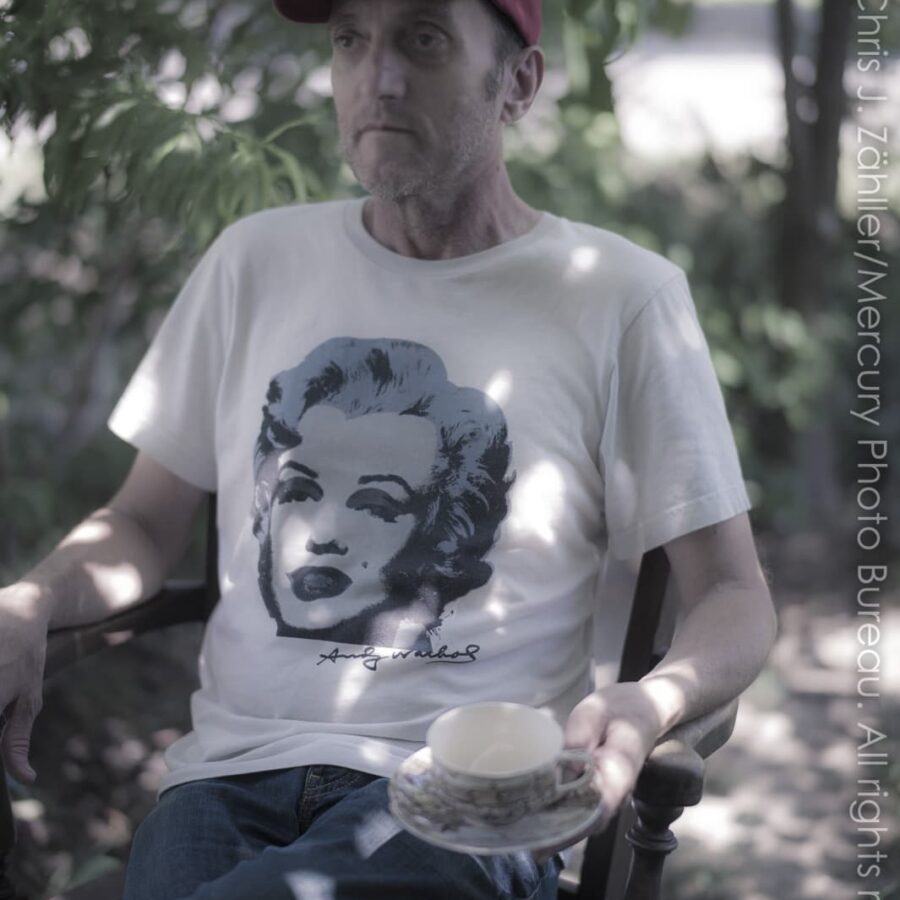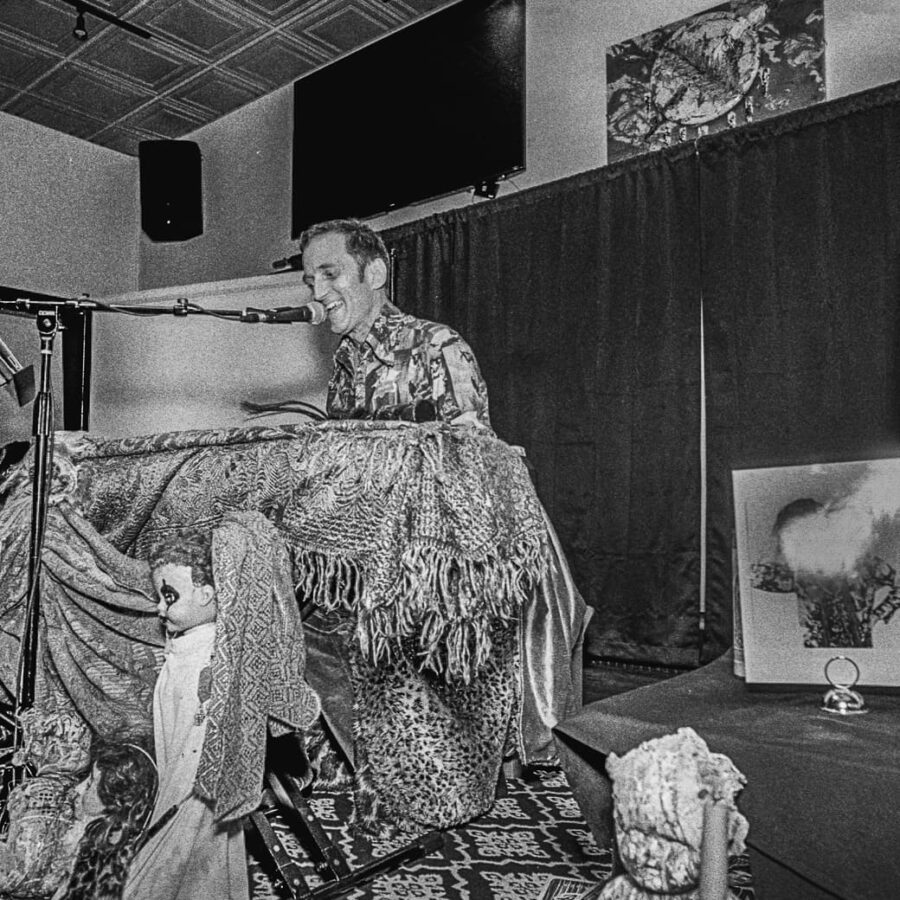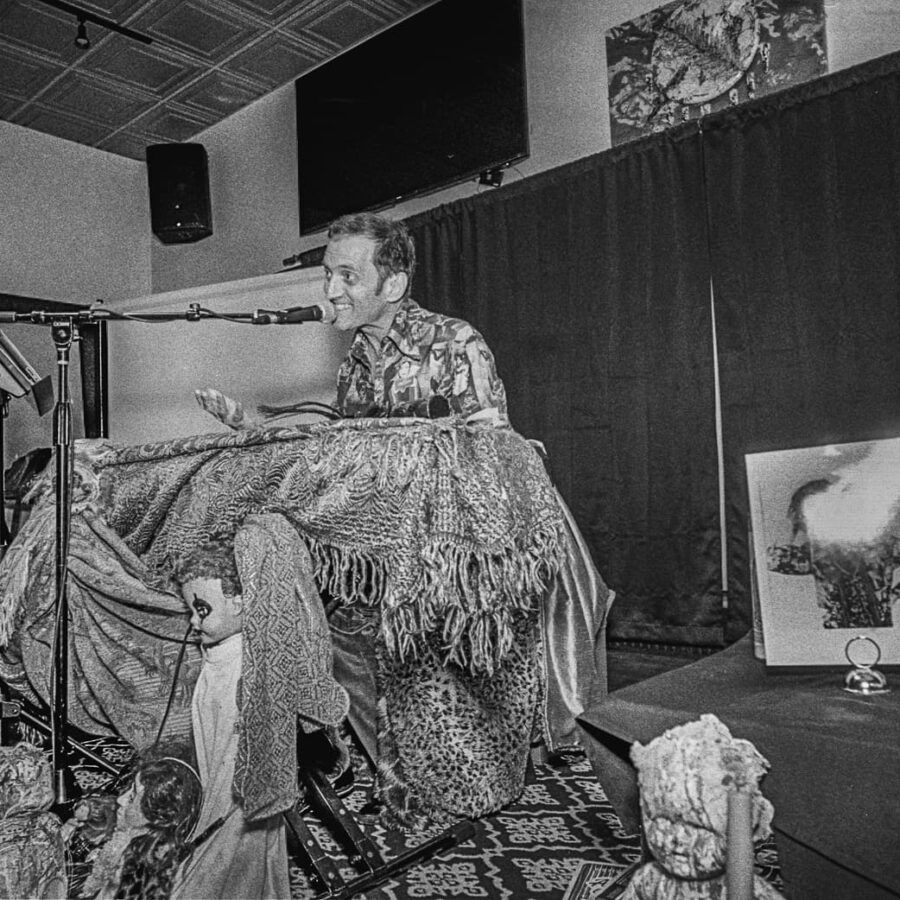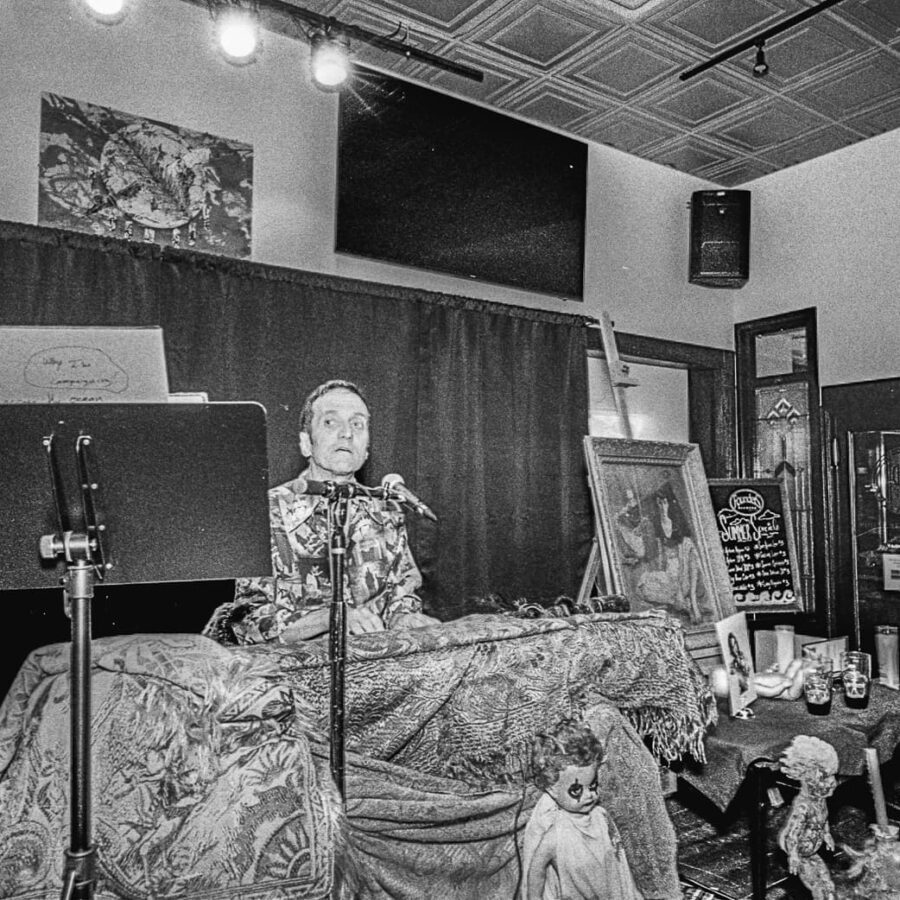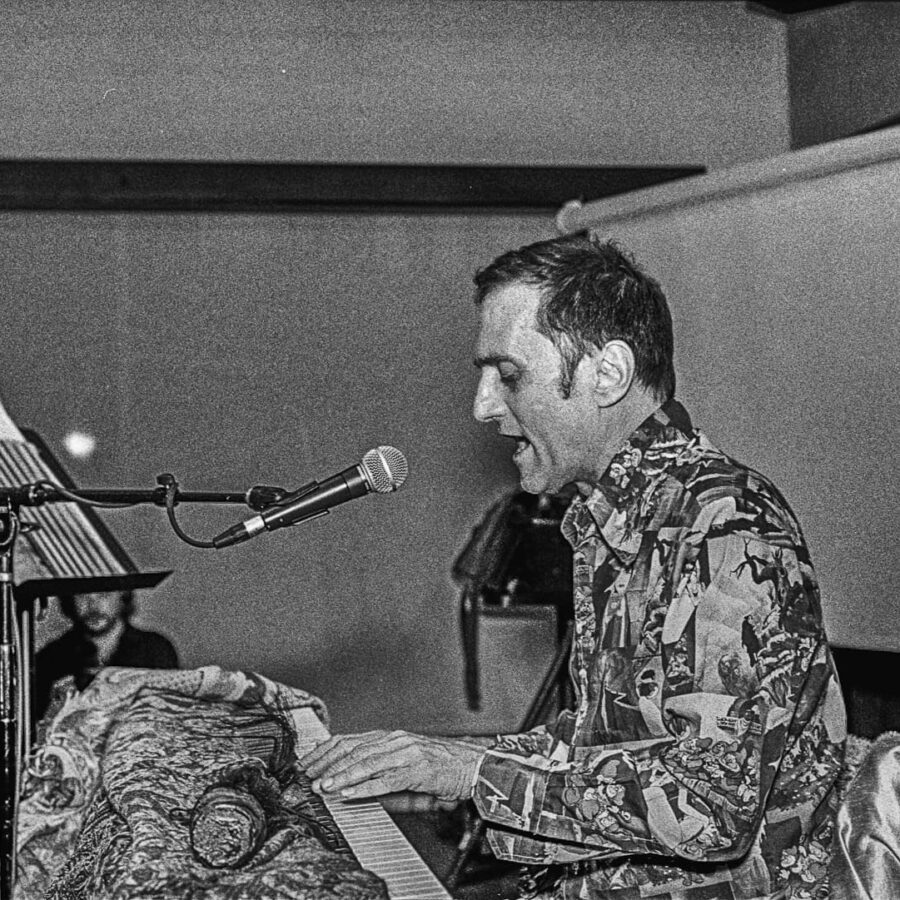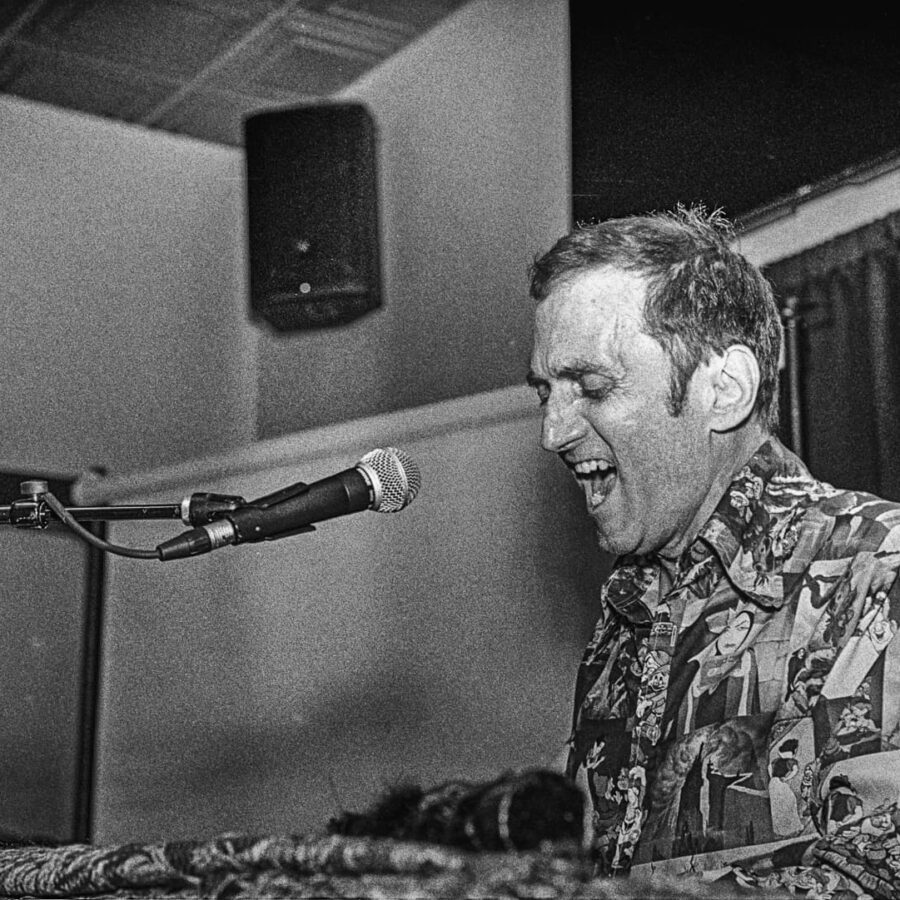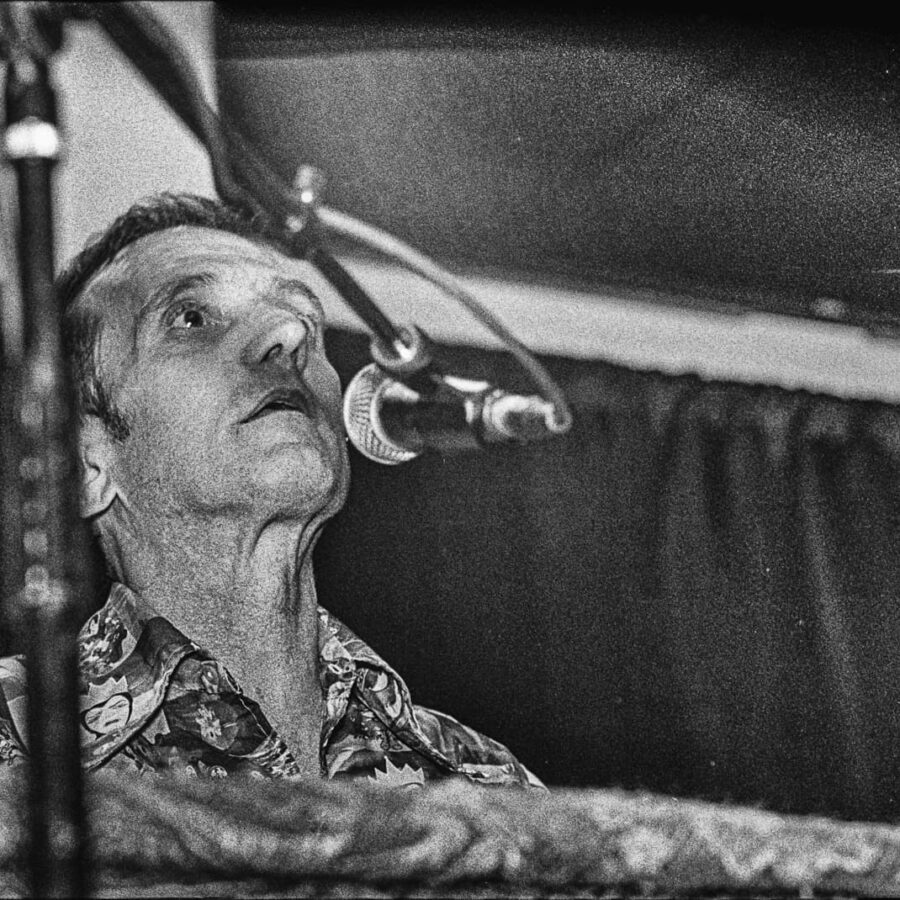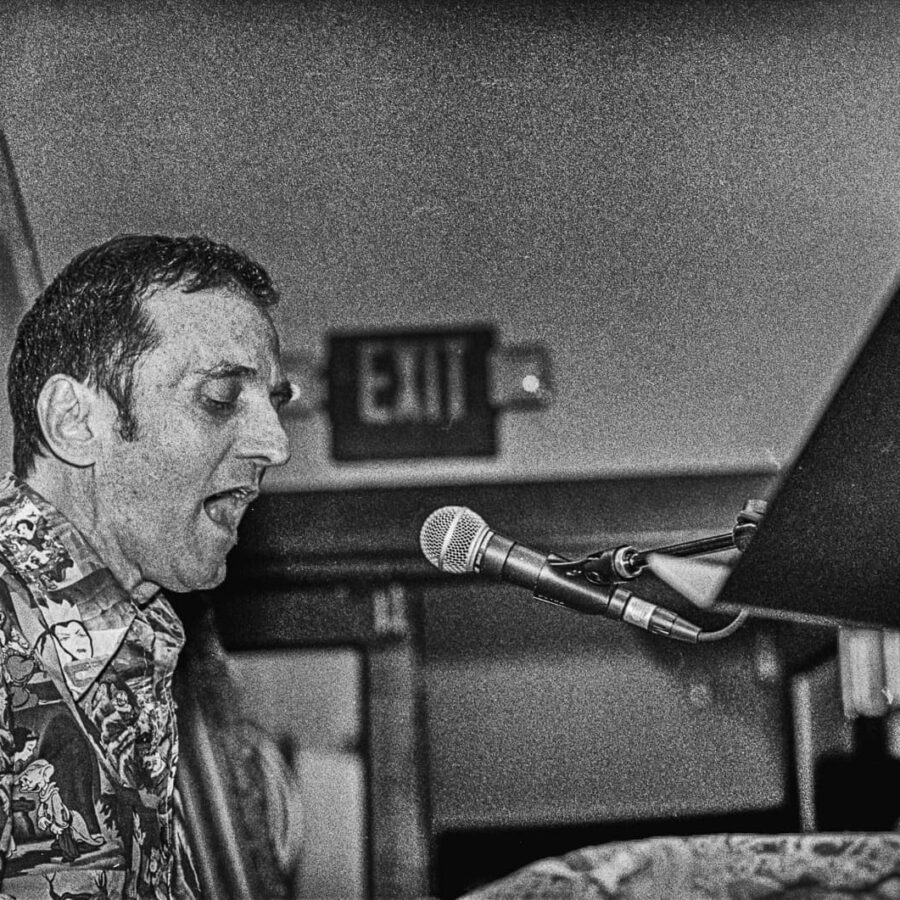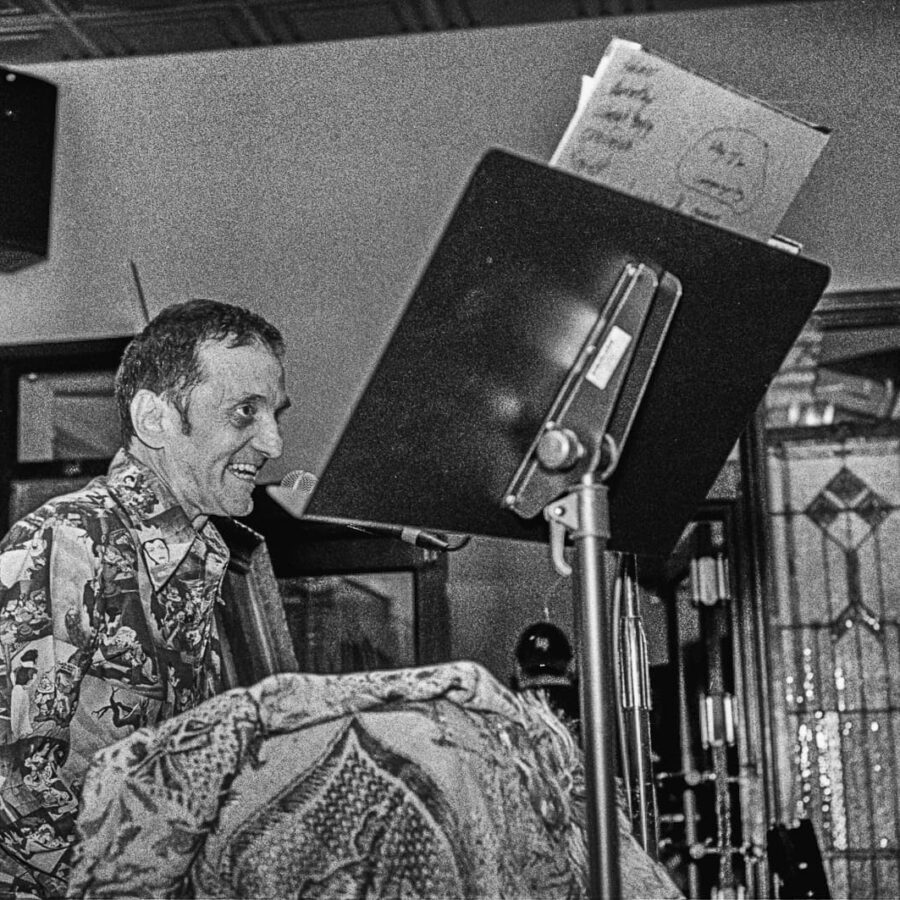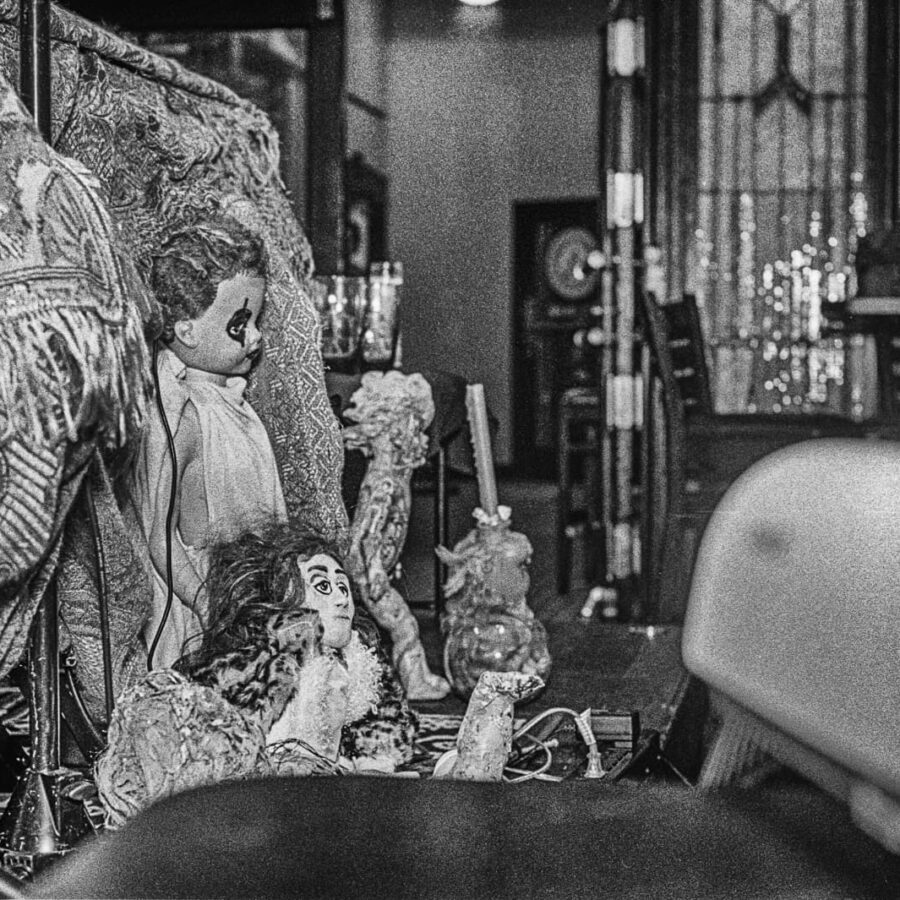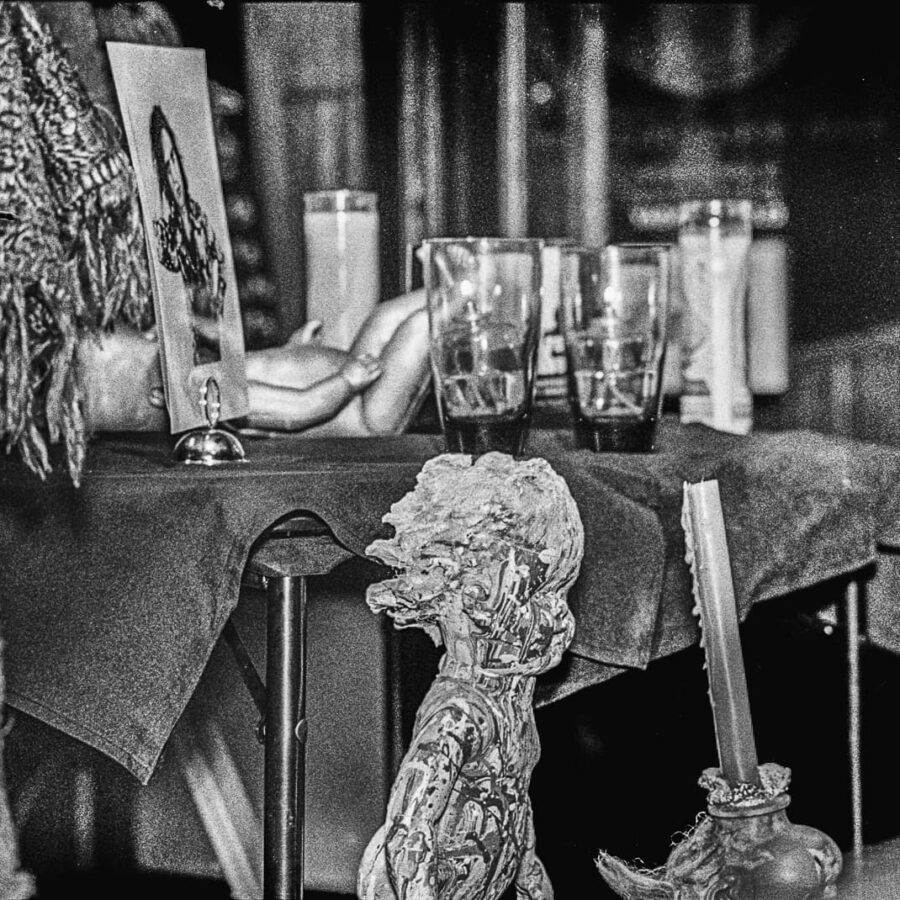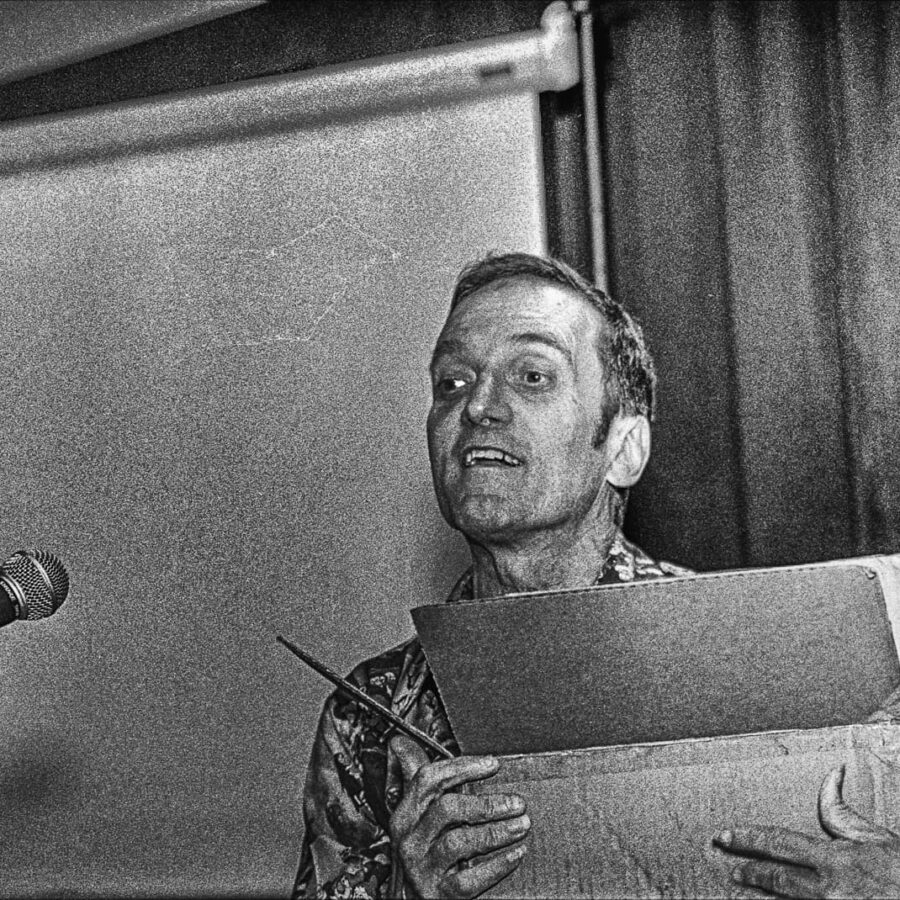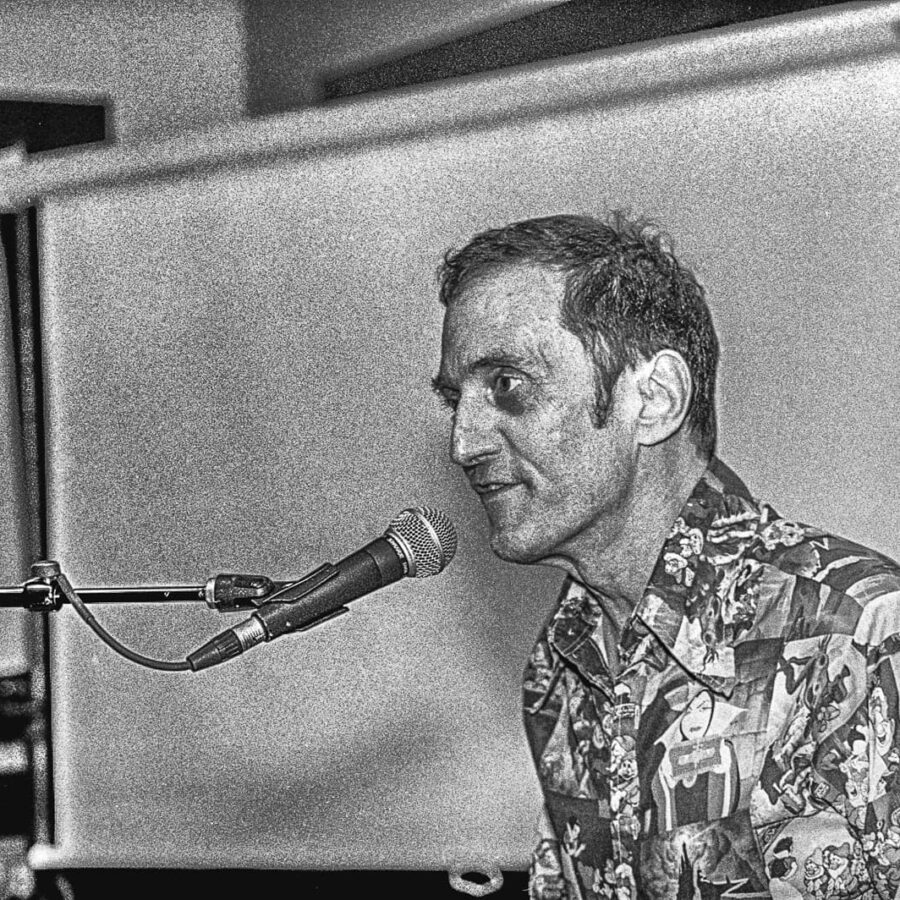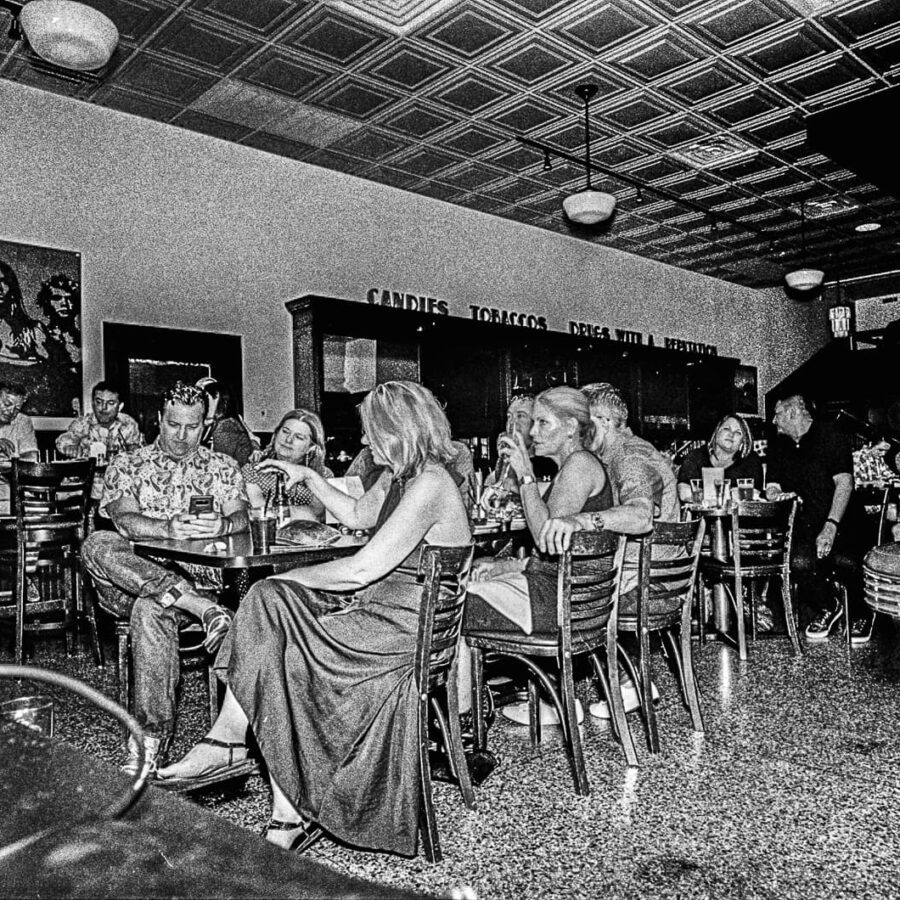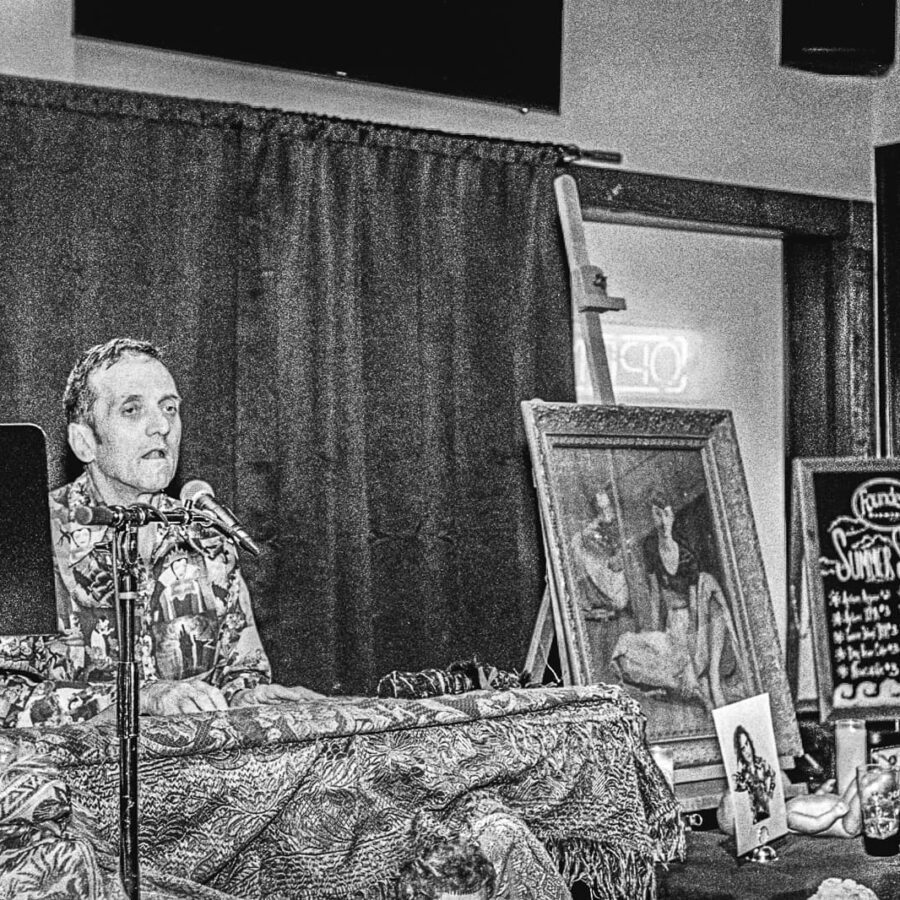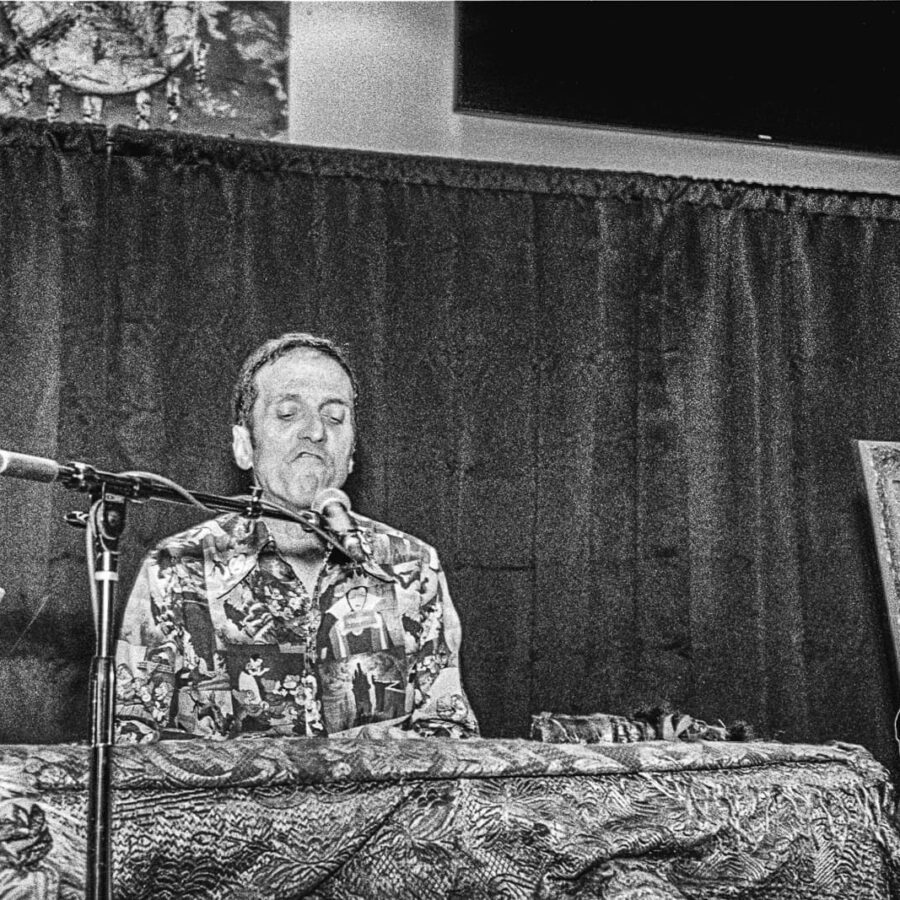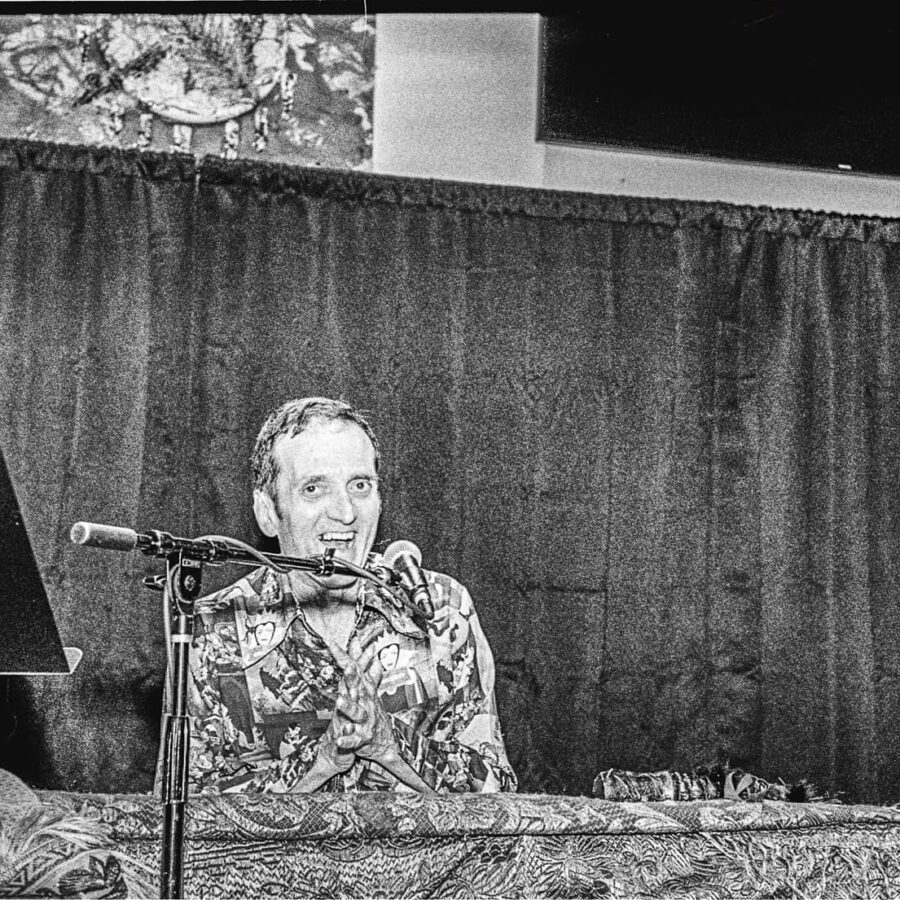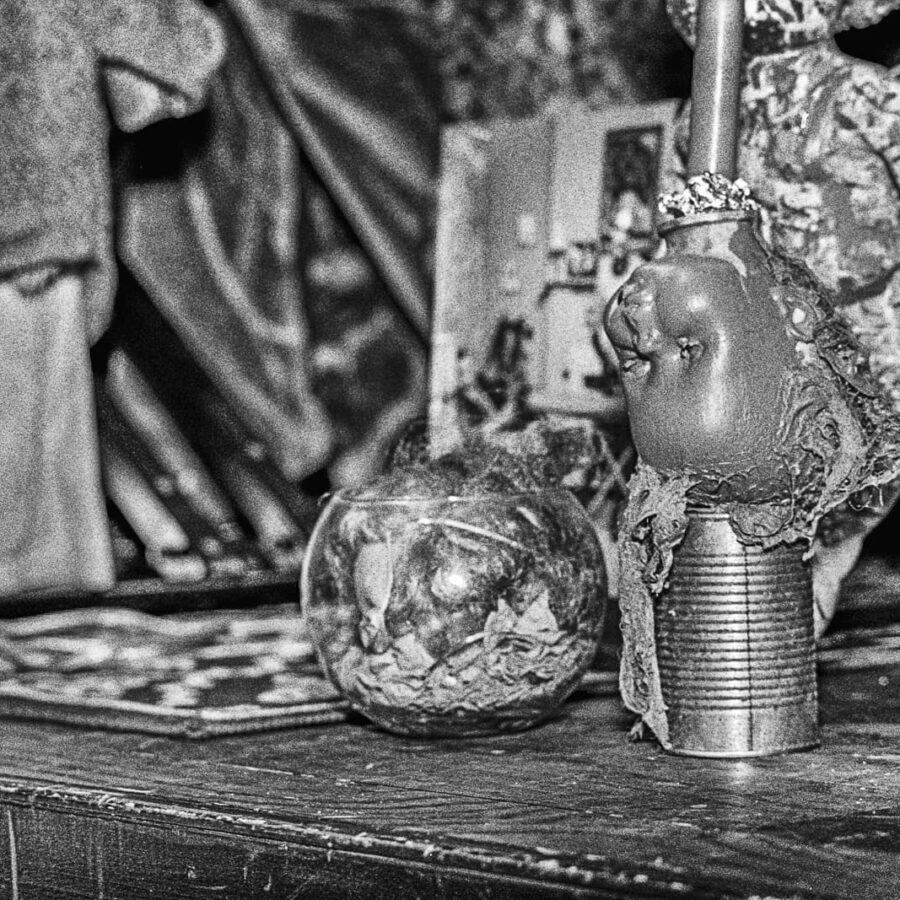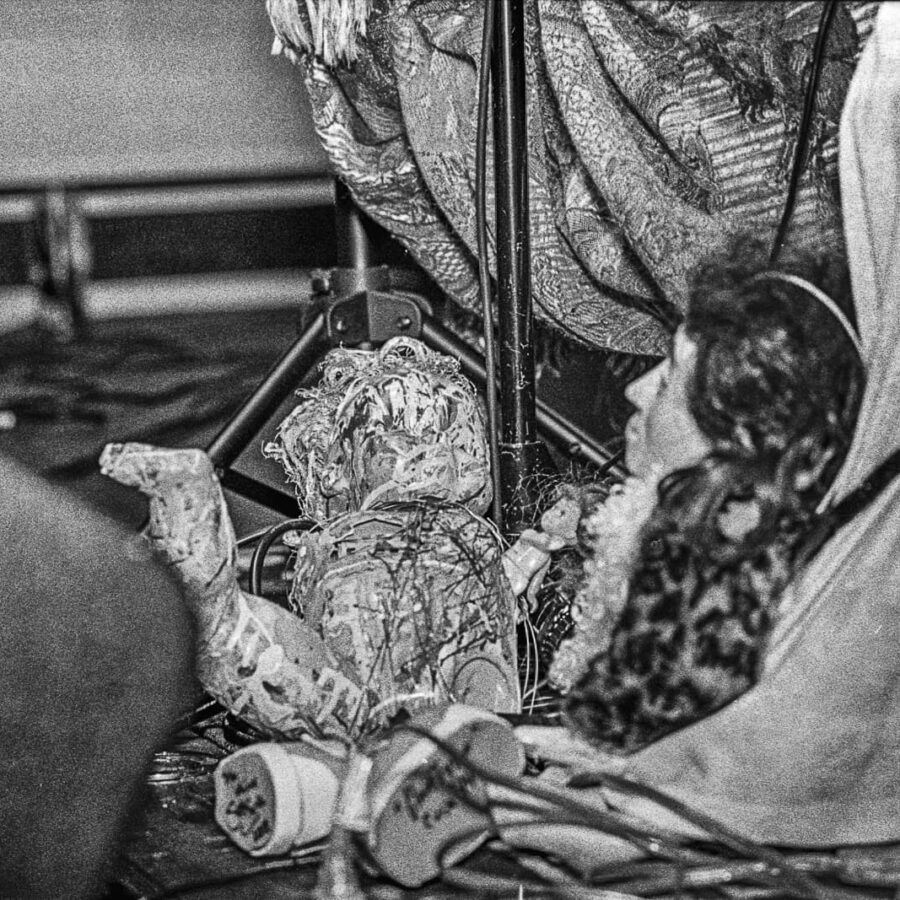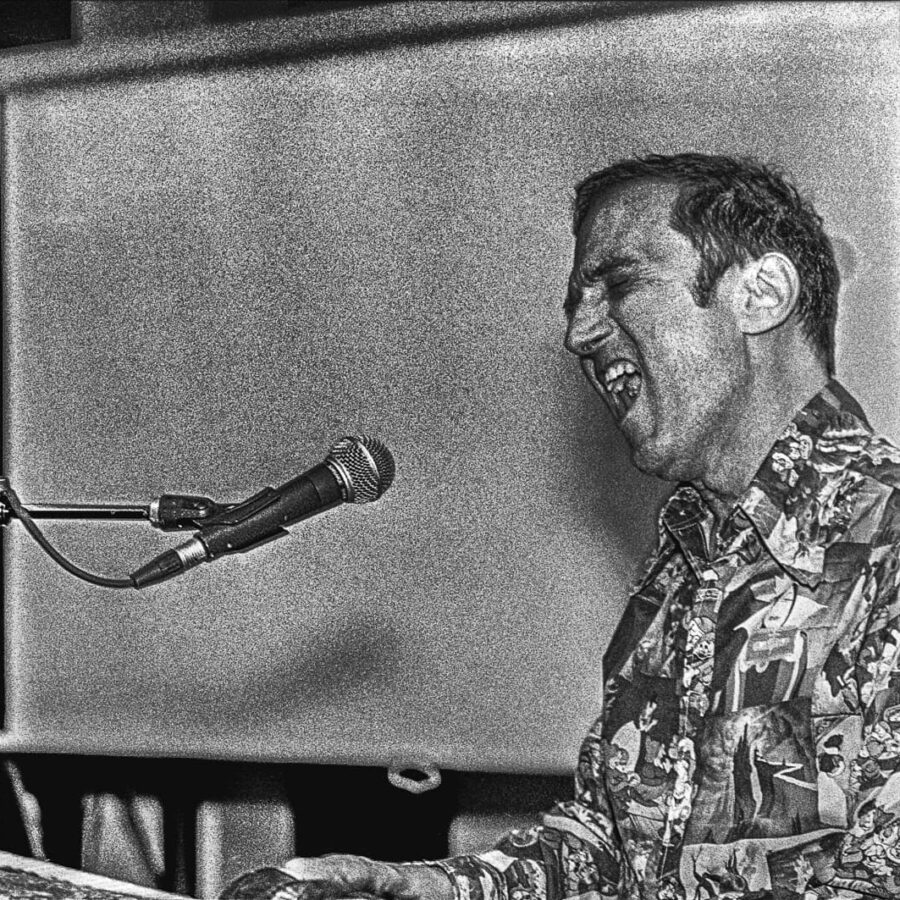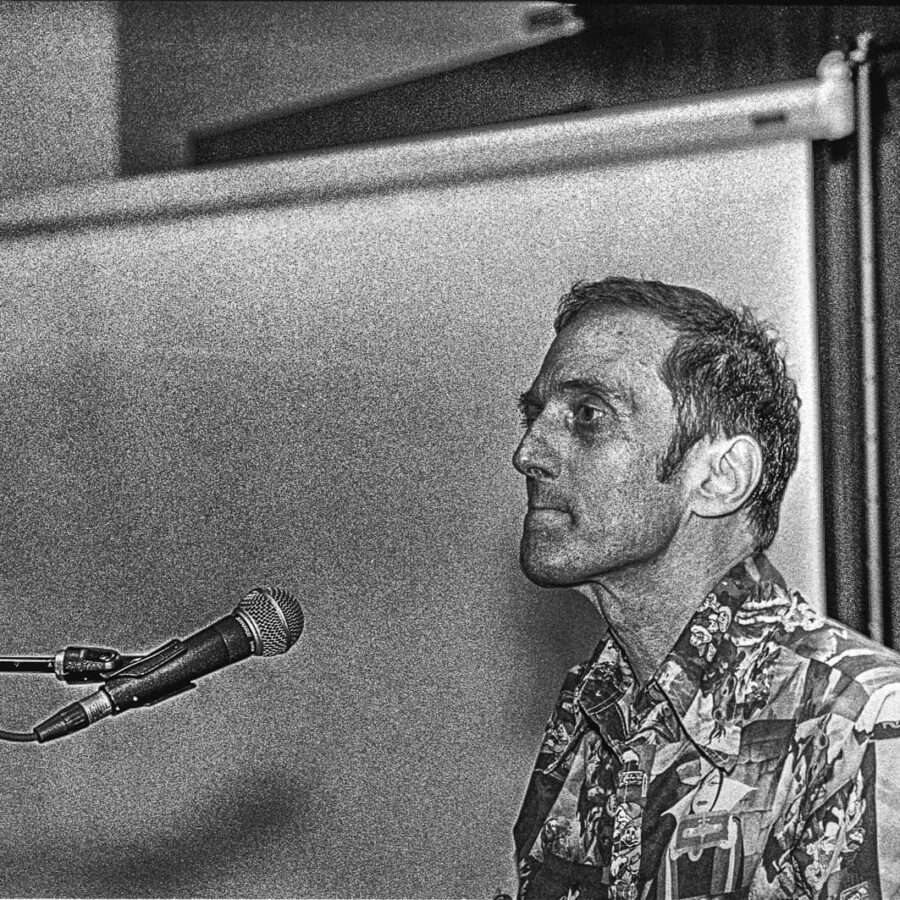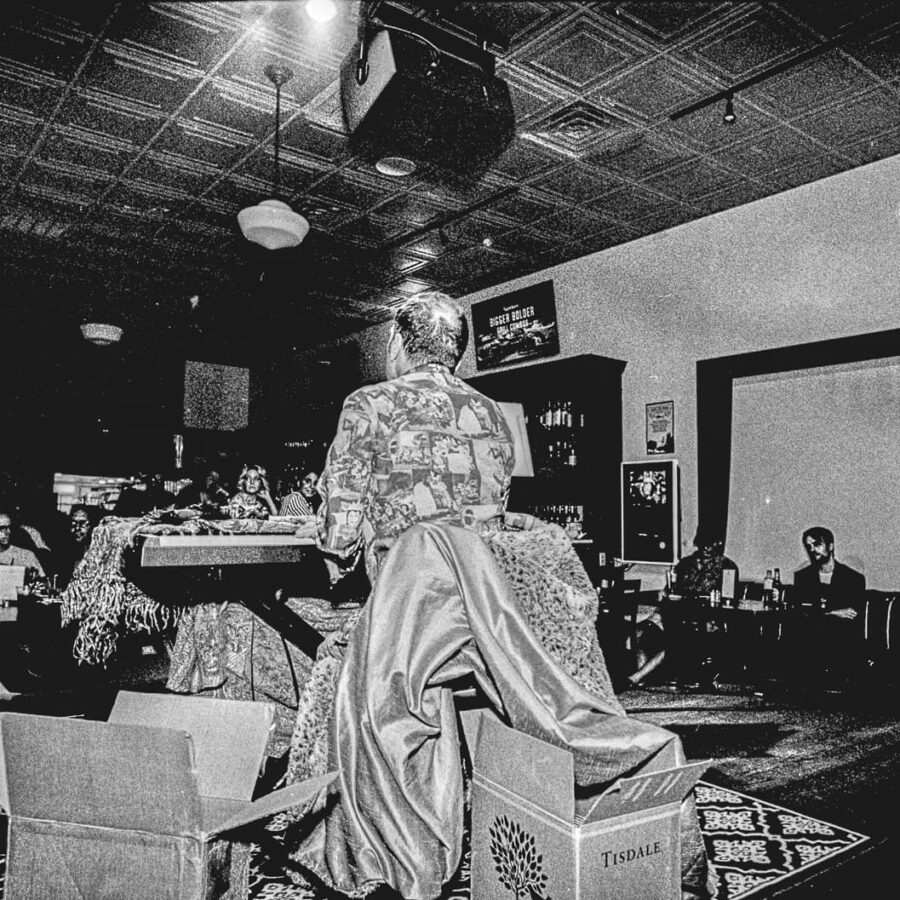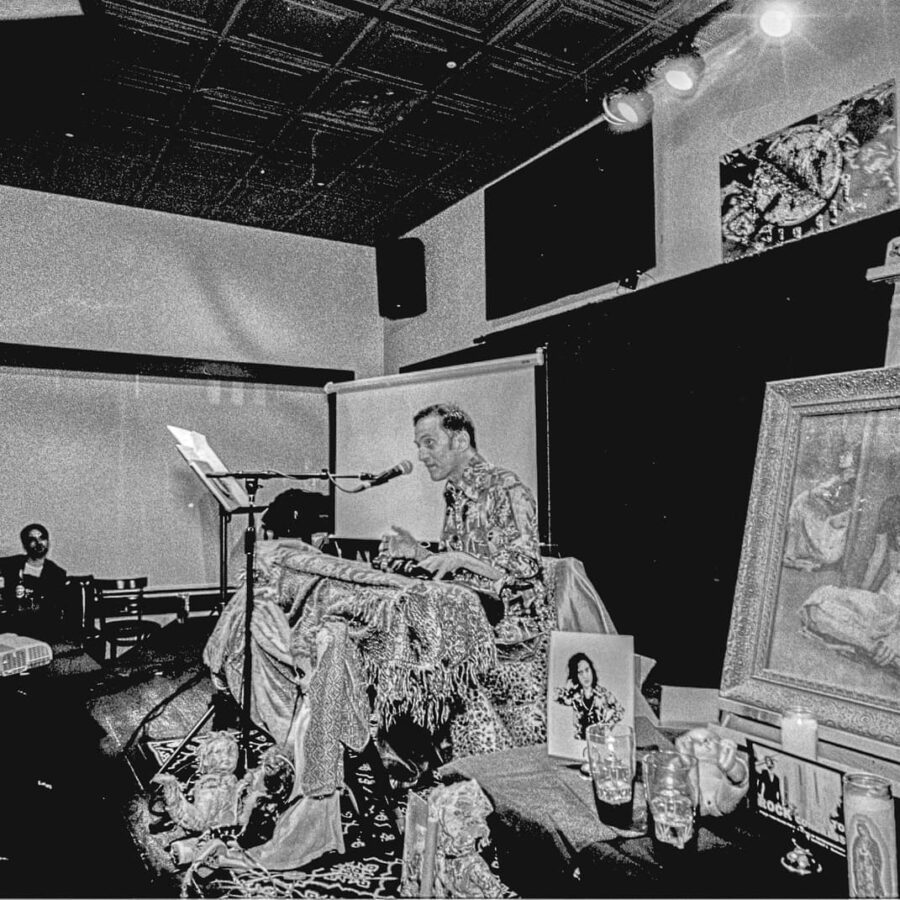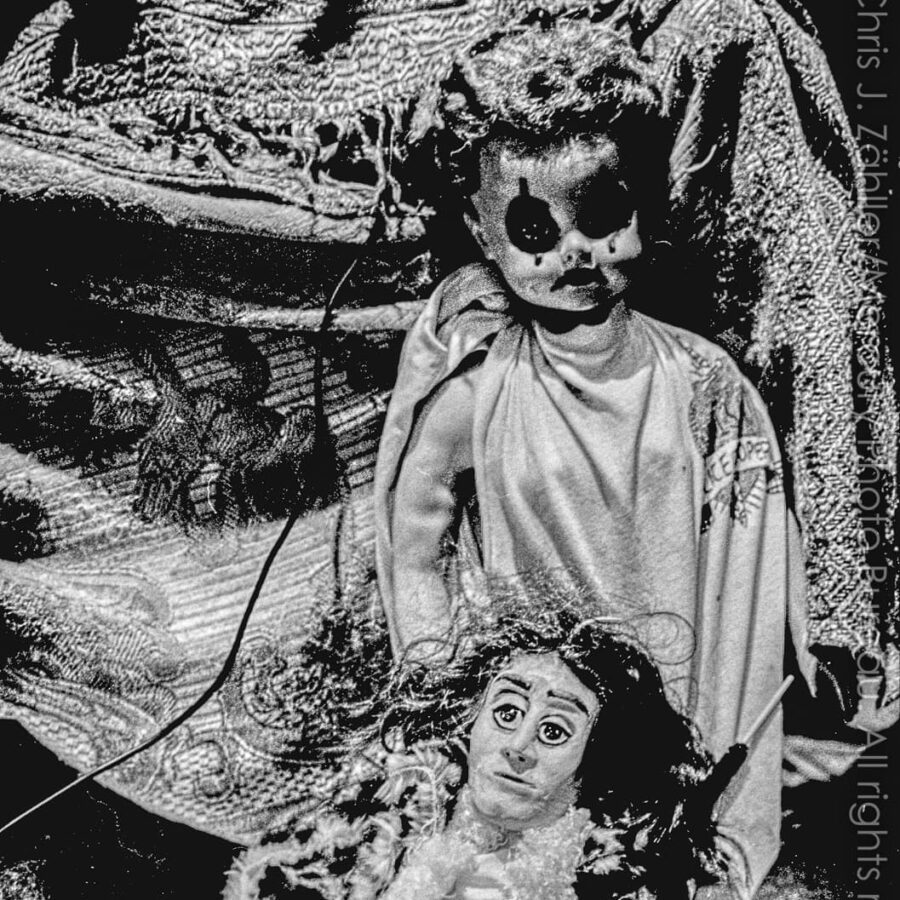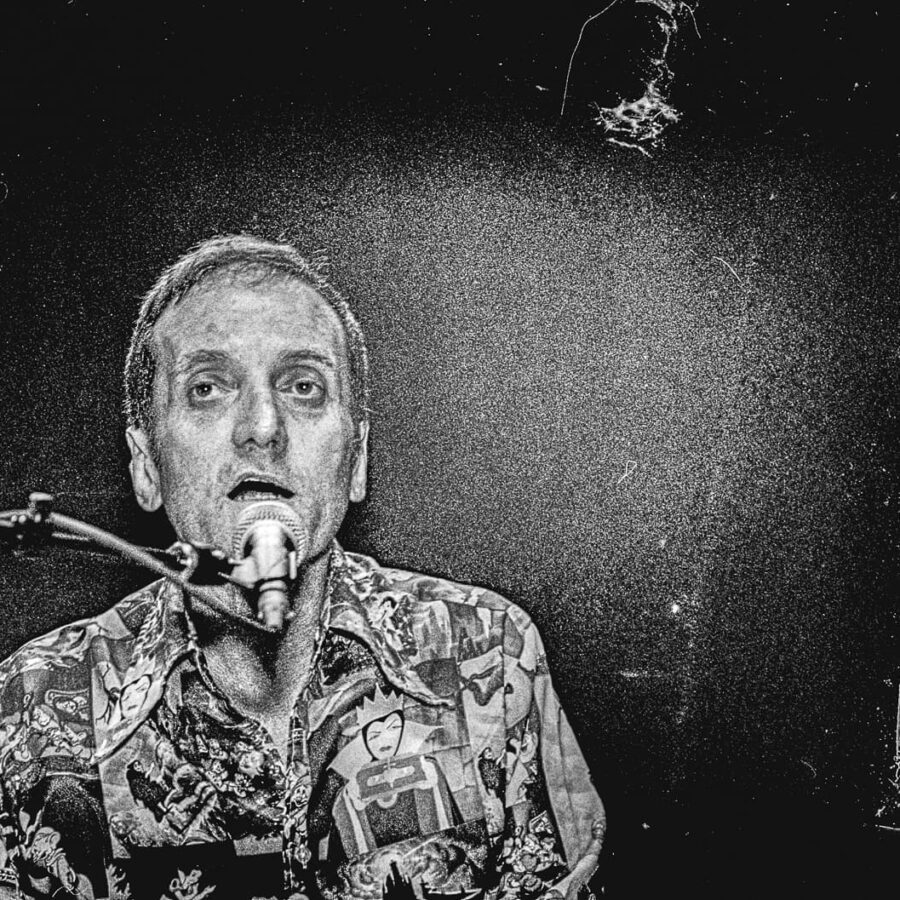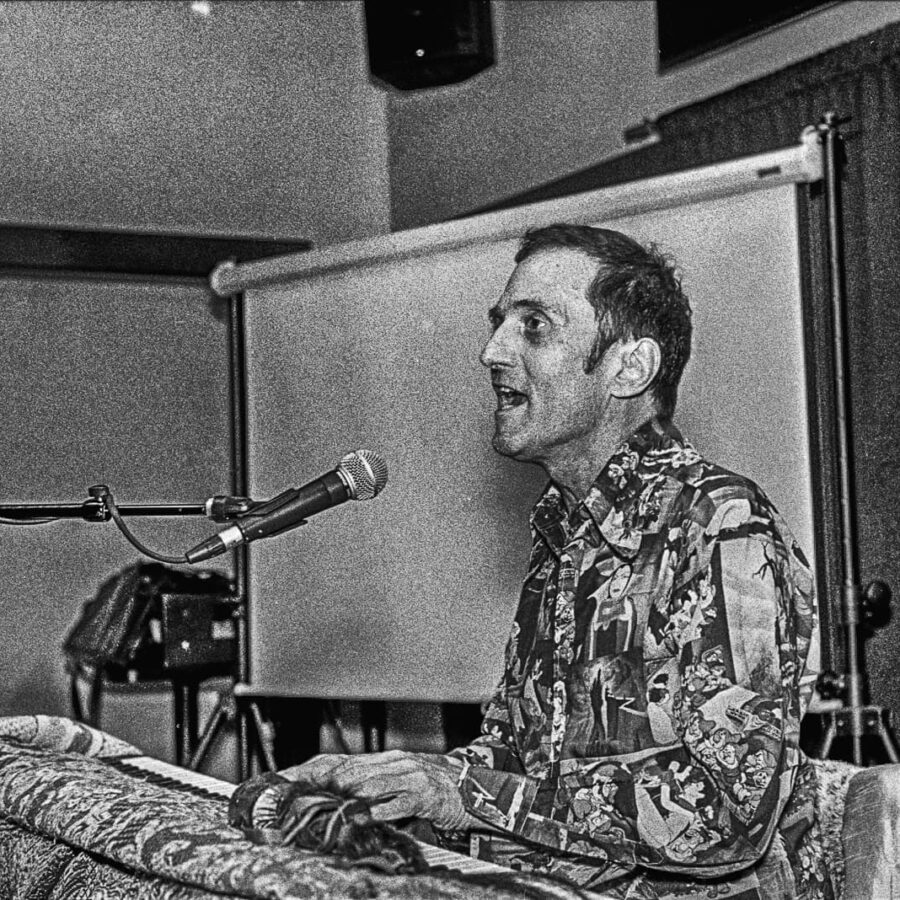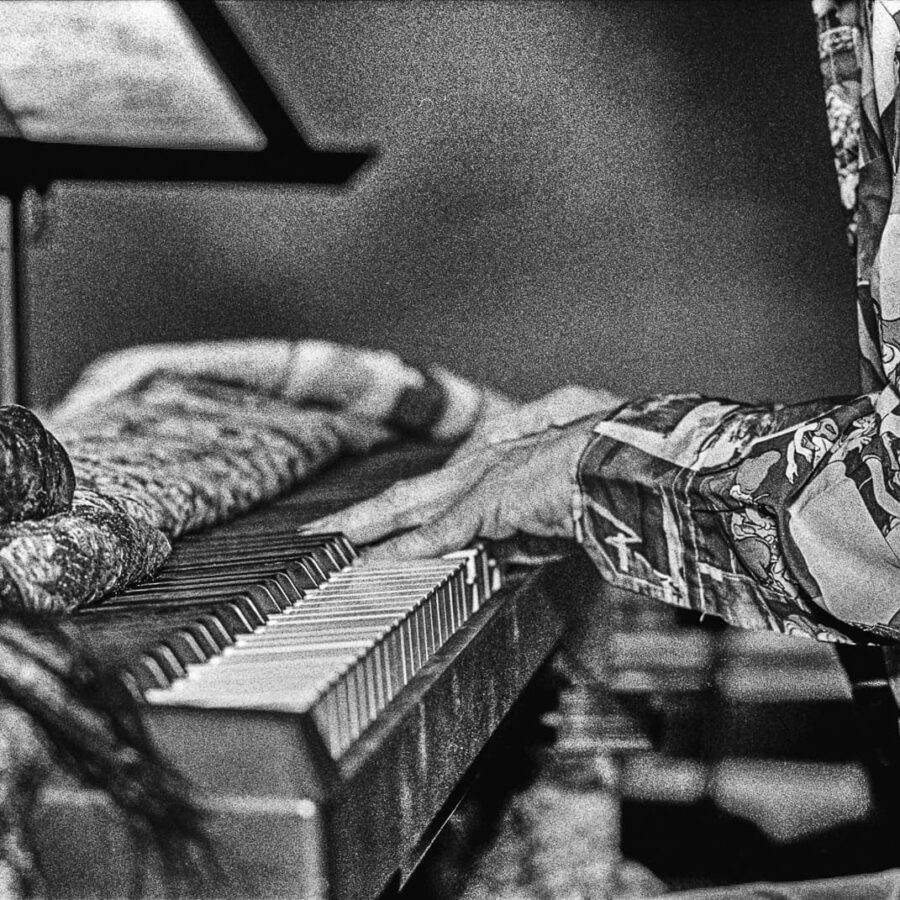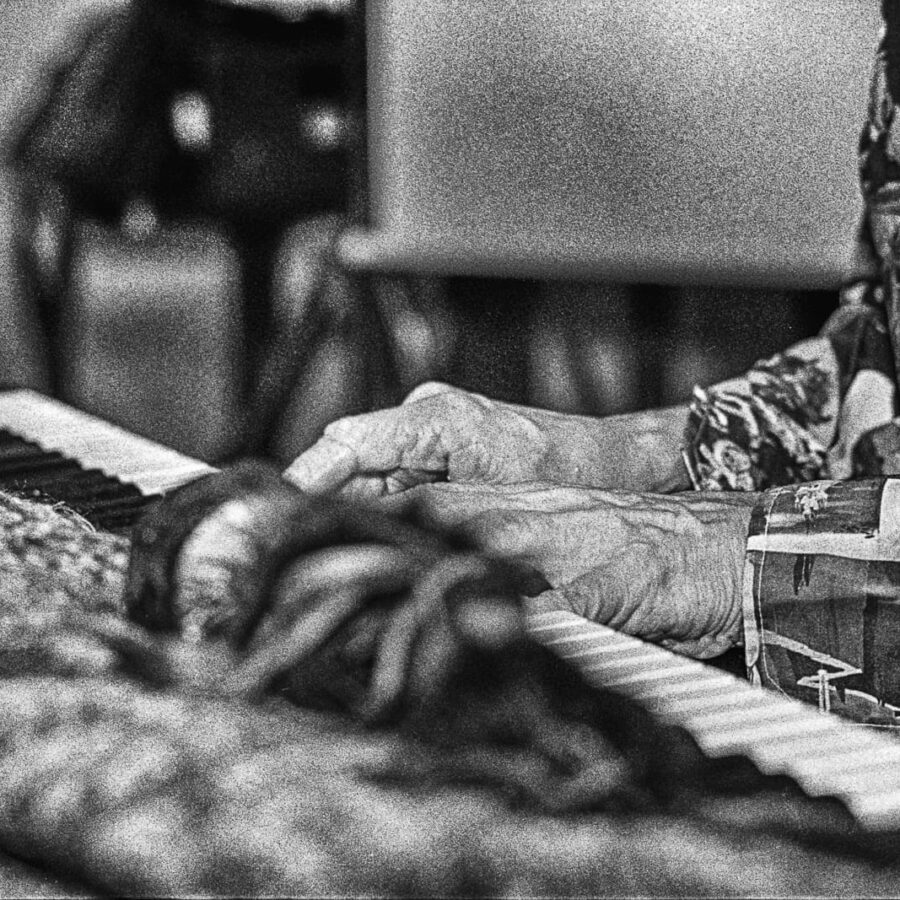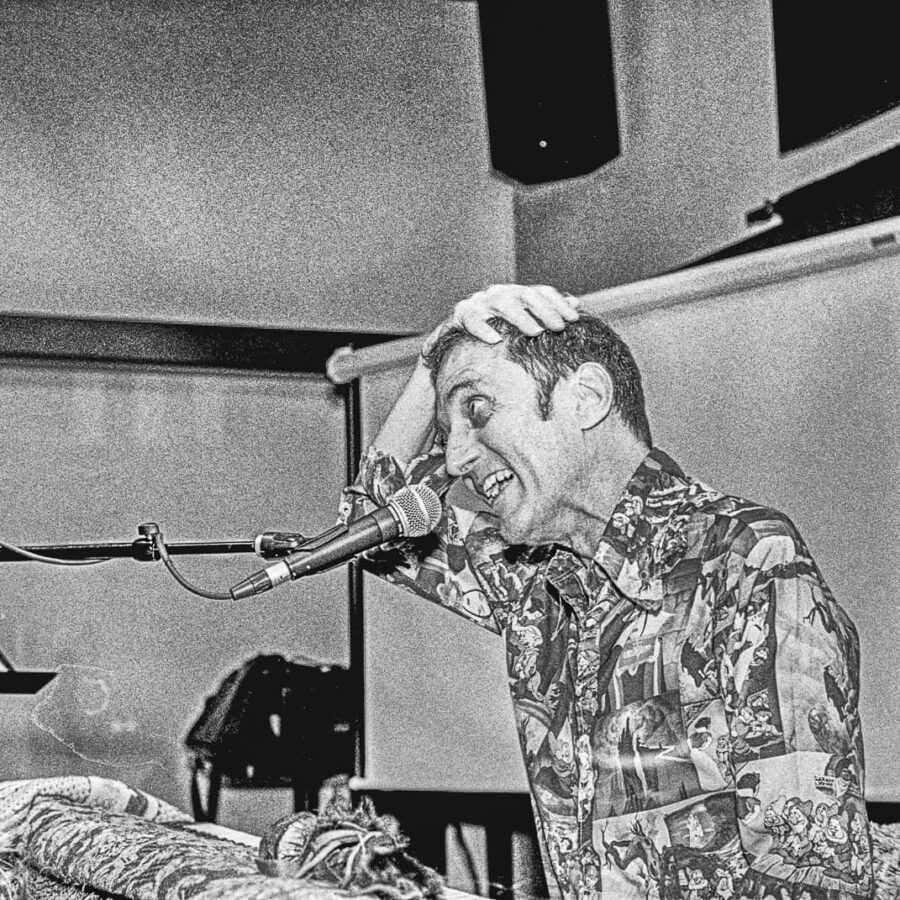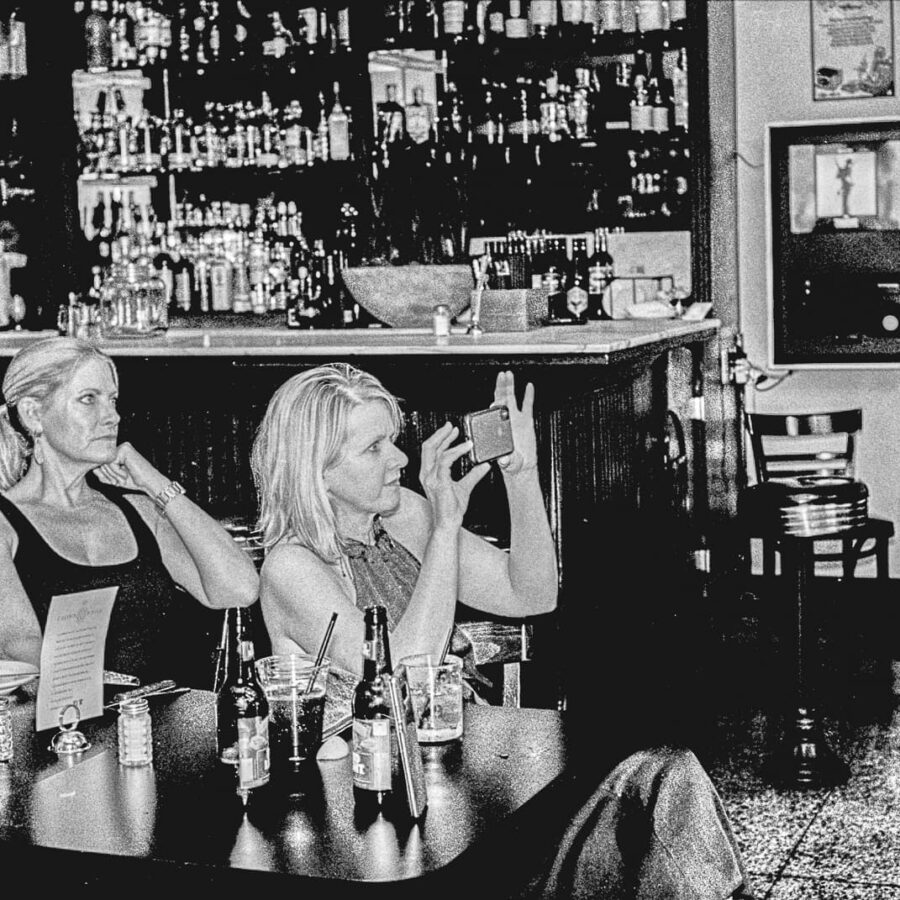
Tea with Tyson Meade (Interview & Gallery)
The Interview
Phonograph Needles and Silver Needle Tea
On 26 May, central Oklahoma felt an earthquake. The vibrations were from the needle dropping on Godfather of Alt-Rock [Sidenote: I’ve not been able to track down the first print reference to this coinage. Spin magazine, Out magazine, AV Club, Brooklyn Vegan, and the Converse Shoe Blog all seem to have started using the moniker sometime in 2014.] Tyson Meade’s new long player, Robbing the Nuclear Family. The 55-year-old rocker played piano and sang the entire album [Sidenote: This is not quite true, since he forgot the piano part to one of the songs and had to abandon it. Primarily a guitarist, Meade is relatively new to the piano, so cut him some slack, why don’t ya?] to an attentive audience at historic music venue VZD’s Restaurant and Bar. Before Meade took the stage, singer Joe Hopkins screened his new music video, a cover of Meade’s Chainsaw Kittens-era The Loneliest China Place, featuring footage of Meade himself. Meade performed that same song, as well as other Kittens’ favorites, in between songs from the new album.
In the 4 years since Meade’s previous album Tomorrow in Progress was released, he has produced and scored a short documentary and a feature film, and in early April he announced his candidacy for the Oklahoma 5th district U.S. congressional seat.
Meade hosted the Bureau at his 1915-built Oklahoma City bungalow on Friday, where we sipped tea and talked about Robbing the Nuclear Family, our favorite teas, and running for political office in a state where the opposing party seems to have a lock on election.
Mercury Photo BureauYou’ve got a new album.
Tyson MeadeYes I do! It’s called Robbing the Nuclear Family.
MPBI listened to it again on the drive up here. We both grew up in the shadow of the Cold War; the first three songs reference anxiety over the prospect of nuclear destruction in one way or another, but the album takes a sudden hopeful turn on the fourth track, Confused 22.
TysonConfused 22 is an extremely hopeful song coming from the viewpoint of [a young person whose] innocence and euphoria are catching; they’re infectious for the person who is older and jaded and trying to tell the young person, Oh, you don’t know what you’re talking about,
but, at the end of the day, maybe You do know what you’re talking about; really stick to your guns.
But then there’s the outro where I think the older person is frustrated, and the frustration may not not be coming from the 22-year-old, but from the frustration of being the older person.
MPBThere are a lot of percussion parts that remind me of drum and bugle corps — a lot of marchtime, and also a lot of raga-like bits, but filtered through George Martin and George Harrison.
TysonI know it’s on the list of greatest albums of all time, and people want to shoot it down, but Sergeant Pepper’s [Lonely Hearts Club Band] is part of my DNA. The outro of Strawberry Fields —
MPBDaphne Come Out! [Sidenote: The outro on the album’s 8th track is modeled on the outro from the Beatles’ song.]
TysonYes, exactly.
MPBAs soon as I heard it, I knew what you were doing there.
TysonAnd it still sounds — I’ve had these debates about the Beatles, and people talk about how influential the Beach Boys were, and I don’t want to take anything away from the Beach Boys, but the Beach Boys did one thing through Brian Wilson very well. They did it better than anyone.
But the Beatles kept reinventing things. They actually, with Abbey Road, put a blueprint on what FM stereo would sound like for the next several years, with She’s So Heavy and just the medley of A Day in the Life. And not only that, A Day in the Life set the whole Moody Blues career in motion: Tuesday Afternoon is basically A Day in the Life.
MPBYour previous album, Tomorrow in Progress, is 10 songs and 44 minutes; Robbing the Nuclear Family is the same number of songs and clocks in at 38 minutes. It feels like nothing is wasted; all the songs end exactly where I, as a listener, want them to.
TysonTomorrow in Progress set in motion where I was going; it was getting in the car and turning the key and getting out onto the highway. Robbing the Nuclear Family is getting on the highway and going exactly to your destination, and a lot of that — and I’m trying to actually figure out in my mind, because as an artist, in no way was it manufactured. I knew there was a destination, but I didn’t know exactly what it was, but I wanted to get there quickly. Tomorrow in Progress opened my mind to a new way of writing, because I was in China, and then Robbing the Nuclear Family, my mind had been opened, so it was easier to write these songs that were way more free, but tighter.
I started with a real loose soundscape on Candycanes and Moonbeams, on Motorcycle Boy #3, and also a soundscape on Grandsons of the Empire. After that I would sing to it and tighten it up.
MPBYou mentioned Motorcycle Boy #3. Your first solo album was Motorcycle Childhood. Are they connected?
TysonMotorcycle Boy #3 is autobiographical. I was in Thailand, and there was a motorcycle taxi stand by my hôtel. And motorcycle boy #3, Bang, was always there. And I would come out of my hôtel, and he would say, Where would you like to go today, sir?
And I learned his name, and as time went on I felt we became very close, because I was there for a month, traveling around the country. And he just had this innocence and wonderfulness, and I loved him in this way I guess a tourist would love a new friend. But it was a very fleeting relationship, because I knew I wouldn’t be there for very long.
MPBMany of the songs on here are story-telling songs, but you are not afraid to veer off into the opaque and the poetic. When you write a line like that, do you know what it means?
TysonNo. Never. Lines will come to me from somewhere, and I will say, Oh, that belongs in this song, somewhere,
and I don’t know why, and sometimes it may be a McGuffin, but sometimes, later, it will make sense. When I’m songwriting I know I’m trying to get to a place, but I never — I know some songwriters are craftsmen who will say, I’m going to write this song about this couple who gets divorced, and he gets the pickup truck, she gets the china,
but my songs are never that way. A lot of times I’ll have the song and all the lyrics — and even more lyrics than I can sing in one song — in maybe fifteen minutes, and notes and notes everywhere, and I’ll keep adding lines. And I come back later and edit. The lines that are metaphorical, I have my meaning, but I don’t want that to have to be the meaning.
MPBAfternoon after Practice — it sounds like you got to use that shaker [Sidenote: Tyson brought a shaker that was given to him as a gift to the album release show, but explained that he would not be playing it.] on that one. It sounds like it’s the same tempo and key as the song that preceeds it, Grandsons of the Empire; in fact, when I was listening to it on the way up here, I started singing the verse from Grandsons on top of it, and it fits over it. Did you know that? Was it deliberate?
TysonAbolutely not.
MPBIn Grandsons of the Empire, is that a specific empire, or just empire as an idea?
TysonMore of an idea. It starts the second side and maybe, it recalls the first song [one side one], you know, that we’ve come to this place, and there’s so many of us. That was one of the songs I wrote in China right after I made Tomorrow in Progress. I’d already mixed Tomorrow in Progress, so that song and P.S. Nuclear Forest Dance Boogie were the first songs that I wrote for the new record. They all have to do with home, and trying to find home, and what is home. And Grandsons of the Empire is […] trying to figure out where home is. And I think, a lot of us are trying to figure that out. […]
MPBWhat’s your favorite tea?
TysonYou know, I really do like [long pause].
MPBYou can say Lipton.
TysonI do like just black tea in the summer, and I really like Earl Grey in the winter. I’m from the south, or the southwest, or whatever you call it, and I like just, regular iced tea.
MPBYou’re running for congress.
TysonI am running for congress. It’s gonna sound corny: I want to give the government back to the people. The teachers’ walkout galvanized me. I was so inspired by what they did; they said No, we’re not gonna take this; we are gonna stand up and fight for education, for ourselves, for our students, for our schools, for the future of Oklahoma.
It seems to me the legislature and the governor are trying to dumb down Oklahoma any way they can. […] It’s harder to oppress a well-educated society.
I feel as if they want us uneducated so they can continue fracking, they can tear up the environment, they can dismantle the EPA, all of these important things. I also feel we need to end the marijuana prohibition. I never thought I’d be quoting [former Speaker of the House] John Boehner, but he said it’s a 70-billion dollar industry and we need to legalize it [Sidenote: John Boehner, Twitter status 11 April 2018, 5:58 A.M. CDT] , and that’s coming from a conservative.
And healthcare — single-payer healthcare for all. Medicare has worked for fifty years for 65-year-olds and older; we should make that available for everyone. Through the taxation of marijuana, we would solve a lot of fiscal problems immediately, [Sidenote: Experts and economists have differing opinions on exactly how much money marijuana taxation would raise.] one of them being healthcare, the other one being education funding. Yet we refused money that was ours for Medicaid; we shouldn’t have done that; that was ridiculous.
MPBWhat makes you hopeful about Oklahoma?
TysonI have been excited to be back in Oklahoma because there’s a whole movement of of music happening. Mount Terror has blown my mind a couple of times, that’s Brennan Barnes from Deer People. I think they are going to do really well nationally, I am excited for them. I love GUM, I love Helen Kelter Skelter, and Skating Polly have moved to Washington [state] —
MPBAre you going to their show tonight?
TysonI’m playing H&8th, but I’m going to try to make it.
I guess with Oklahoma, one of the reasons I’m running is Oklahoma has always been kind to me, to the [Chainsaw] Kittens, and when we have a platform to speak on, we should, when we see that things are not [as they should be]. I’ve never been political, but I’ve been on the frontline, as queer, and I’ve shown that lifestyle in the public eye. And I’ve had so many kids in high school who came up to me — especially when the Kittens were doing well — and now they’re teachers and whatever now, you know, they’ve grown up listening to the Kittens, and they’ve told me, You made me feel better about myself, because, before you came along, there was nothing like you in Oklahoma,
and so — I — I was just doing my thing, back then; I didn’t really think of it. I just wanted to be who I was and I wasn’t going to be — who I wasn’t — and now I understand the power of just being yourself.
In a political platform, I can be who I am, and I can speak about the issues, and issues as I learn about them, like, human trafficking, Oklahoma City is the 4th busiest hub for human trafficking in the United States. We need to look at these things that have been swept under the rug. At the same time this is a wonderful place to live, and we are fairly accepting of people here. I had a conversation with my buddy Trent Bell a while ago, and someone had said something anti-gay, and he said, That’s just weird,
because now, it’s just weird to be anti-gay. [Being gay] isn’t the taboo it once was and now when someone says something like that they just look like a bigot.
So, I feel like Oklahoma is way more forward thinking than the rest of the country give us credit for. [Sidenote: Short discussion of Rivka Galchen’s New Yorker essays and Oklahoma’s socialist roots omitted for length — Ed.] I’m putting a lot of hope in the millenials.
MPBThank you for the tea.
TysonYou’re welcome.
Gallery: Album Release Show
Gallery: Album Release at VZD’s
All of the pictures except for the color portrait were shot on Kodak Tri-X with a Leica MP Classic 35mm rangefinder camera and developed in Adox Adonal (Rodinal). After scanning, retouching was made with Adobe Lightroom and NIX Silver Efex Pro. The color portrait was made with a Leica M9‑P digital rangefinder.
